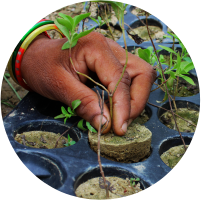views

Though the Covid-19 pandemic stunted the performances of businesses worldwide, the stevia industry was lucky not to receive a fatal blow from it. This is mostly because people became more conscious about their health and immunity during the lockdown period, thus increasing the demand for natural sugar substitutes like stevia. The increasing number of people being afflicted with diabetes, obesity, and cardiovascular diseases has also given a much-needed push to stevia manufacturers to boost their business of this zero-calorie sweetener.

Market Size and Shares
The global stevia market was valued at USD 638.69 million in 2021 and is predicted to reach the mark of USD 771.5 million by 2022, and USD 1.11 billion by 2028. The number of producers of stevia is increasing by the day, both at the local and global levels. Currently, the Asia-Pacific region accounts for the largest market share for stevia, followed by North America.
Based on its form, the stevia market is divided into two fractions- leaves and extracts. The latter is further categorized as powdered extracts and liquid extracts. Owing to its easy availability, convenient usage, and higher solubility; powdered stevia extracts are the most popular variety. Having already generated the largest portion of revenue in the stevia market in 2021, the powdered stevia segment is estimated to expand at a CAGR of 8.7% from 2022 to 2030.
On the basis of application and end-use, the stevia business is most flourishing in the F&B industry. A stevia manufacturer supplies his extract for use in dairy products, baked goods, sauces, and seasonings, etc. The beverage segment holds the most dominant market share under this categorization. The increasing health consciousness among people has compelled beverage brands to either launch a new line of sugar-free drinks or reformulate their existing recipes by replacing sugar with a low-fat and low-calorie substitute like stevia. Consequently, the beverage segment of the stevia market is expected to have a CAGR of 9.8% between 2022-30.
Key Market Trends
As discussed, the masses are becoming increasingly conscious about their health and fitness. Sugar reduction is now a global trend and the driving factor behind the popularisation of stevia. Artificial sweeteners are associated with digestive issues, and organic sugar substitutes are the need of the hour. The rising demand for dietary supplements and zero-calorie food and drinks can be banked upon to cause an increase in the number of producers of stevia.
In the interest of public health, many countries in the world have started imposing a sugar tax on food and beverage companies. For example, the UK government taxes soft drink firms for using more than 5% added sugar in their recipes. Mexico, South Africa, and Saudi Arabia are some other players in the league of taxing sugar-sweetened beverages. Consequently, F&B brands in these countries have replaced sugar in their recipes. The sugar tax has thus increased the scope of expansion for the stevia market.
Arboreal
Arboreal is an award-winning plant biotechnology company providing premium stevia solutions to businesses worldwide. Through years of extensive R&D, the Arboreal team has garnered expert know-how on the use of stevia in different recipes and is willing to share the same with brands that partner with them. Get in touch with this India-based stevia manufacturer and turn your sugar reduction ideas into reality in 30 days.












